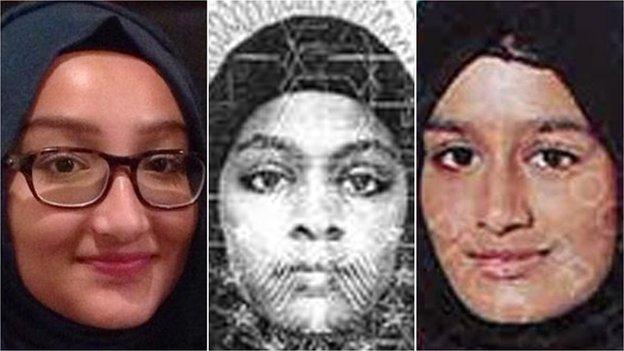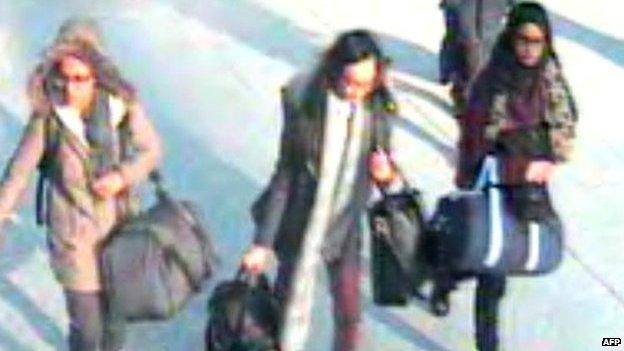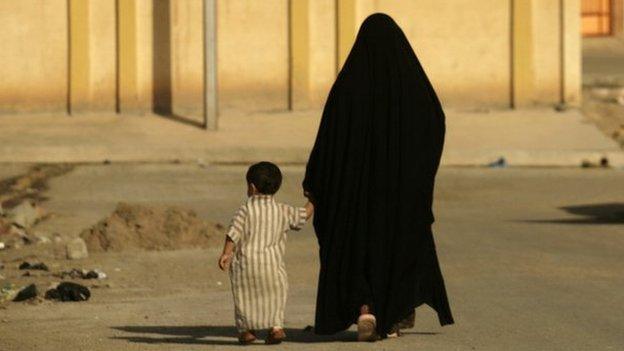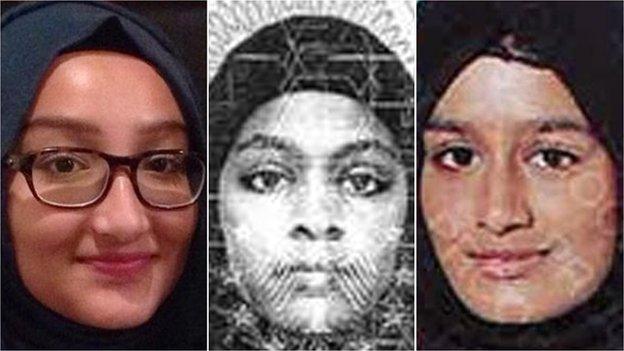Missing Syria girls 'have contacted family'
- Published

From left: Kadiza Sultana, Amira Abase and Shamima Begum flew to Turkey in February
Three schoolgirls from London who are feared to have joined Islamic State in Syria have made contact with their families, their lawyer has said.
Shamima Begum and Amira Abase, both 15, and Kadiza Sultana, 16, flew from London to Istanbul on 17 February.
Tasnime Akunjee, who represents their families, told the BBC they had been in contact to say they were safe and were no longer together as a trio.
Two of the girls made contact by internet and one by phone.
Foreign recruits
It comes as Sky News interviewed a woman, external who claims she met, looked after and taught the Bethnal Green Academy schoolgirls when they arrived in Syria in February.
Sky News said the 22-year-old woman, who calls herself Um Asmah, recently defected from Islamic State where she was a senior female commander.
The broadcaster also said the woman confirmed that IS planned to send foreign recruits back to the countries they came from to carry out attacks.
But she said she believed the girls would not return home to Britain and might die in Syria or Iraq.

Police first spoke to the three girls in December after a friend of theirs ran away to Syria
Officers had previously spoken to the three schoolgirls in London in December, after their 15-year-old friend Sharmeena Begum, also from Bethnal Green, ran away to the region of Syria controlled by IS.
Police spoke to them again at the beginning of February and gave them letters to take home to their parents asking permission for counter-terrorism detectives to take handwritten statements about their friend's lifestyle and beliefs.
The girls disappeared three weeks later, having never shown the letters to their parents.
They flew from London's Gatwick Airport to Turkey after saying they were going out for the day.
Their families later criticised police for not passing on the "vital" information before they disappeared.
Scotland Yard said the girls had not been seen as a flight risk.
At least 700 people from the UK have travelled to support or fight for jihadist organisations in Syria and Iraq, British police say.
New research published on Thursday suggests young women travelling to Syria sometimes become involved in IS propaganda and recruitment, but often end up "domestically isolated in severe conditions".
The joint report by the Institute for Strategic Dialogue and the International Centre for the Study of Radicalisation at King's College London also said recruits are increasingly younger and come from comfortable and educated backgrounds.
An estimated 4,000 Westerners have joined IS, including some 550 women.
- Published28 May 2015

- Published24 February 2015

- Published1 March 2015

- Published20 February 2015
